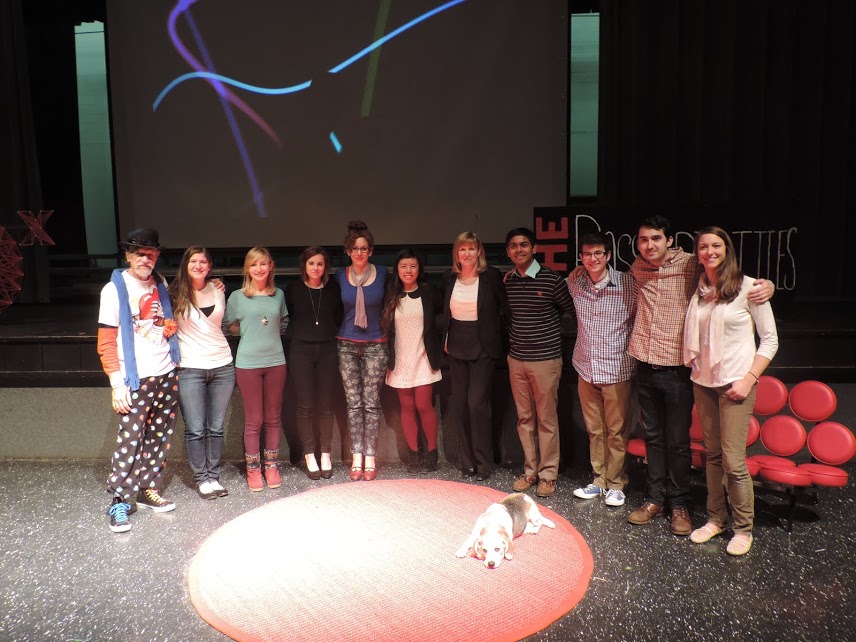|
The Breadcrumbs widget will appear here on the published site.
Our Story, Your StoryEditor's Note: On Feb. 22, 2014, Quail Bell Magazine editor Christine Stoddard and art director Kristen Rebelo presented at TedxYouth @ James River Road. This was an independently organized TED event that took place at James River High School in Midlothian, Virginia as part of the school's leadership program. Speakers included Happy the Artist and reps from The Martin Agency, MeadWestvaco, VCU, and others. All talks were recorded and will be made available online this spring. Below is a more fully-realized version of the talk Christine and Kristen gave at TedxYouth. The Quail Bell Crew thanks James River senior Julie Cao for the opportunity to participate in this event. Speaker line-up with event organizer, Julie Cao (center) Legend has it that Richmond was founded when Captain John Smith realized his ship could not surpass the big rocks in the James River. So Smith stopped and founded the city of Richmond where it is today. But what would have happened if someone other than Captain John Smith and his men had been in that ship? How would the story have changed if someone else had told it? What if other European settlers had been in that ship? What if there had been Spanish, Dutch, French, or Portuguese settlers instead? If this were the case, we may not be speaking English as our main language in Richmond today. What if the stories of early Virginia settlements came from the Native Americans who were already living on the land at that time? What if the slaves and indentured servants working for the English at that time had told the stories of Richmond? All of these people are a part of Virginia's history, even though they may not be a part of "popular history." The full story of Virginia is comprised of many different voices—not just the ones you know from textbooks. How do you fit into the story of Virginia? What stories will you tell and why are they important? Everything's a story. It's important to listen, to observe those around you, and to reflect. Reflections on seemingly insignificant events can make for some of the most interesting tales. Christine's story: When I was a little girl, I had a speech impediment that made me shy and embarrassed to speak up during class. I spent a lot of time observing the world around me and writing stories. My fourth grade teacher, recognizing that I felt different from the other kids, would pull my paper off my desk and read what I was working on to the rest of the class. In a sense, her voice became my voice. The rest of the class could learn what was on my mind without me even opening my mouth. My teacher encouraged me to continue writing no matter what. Kristen's story: Unlike Christine, I had a teacher in elementary school who was not supportive of my voice. I came home one day, outraged about a recent cafeteria confrontation between the boys and girls in my class. My friend and I researched what I now know was the early women's movement, but it was decided at the time to give a report on Susan B. Anthony. Unfortunately, my teacher was not interested in sharing my story and I became nervous that the other kids would make fun of me. In the end, the report was never given because I was worried that my story and my voice were not important. Your childhood affects the kinds of stories you tell and how you tell them throughout your life. The art of storytelling is multifacted and includes many disciplines—not just written word, but theater, oral narratives, song. Visual forms of communication such as painting, comics, even sculpture. Even if you choose not to make a living by telling stories, stories are a part of every profession. Take a doctor, for instance. Everyday a doctor listens to and tells stories. A doctor comes into the hospital, practice, farm—whatever they serve—and uses observation skills to examine patients. The doctor must also pay close attention to what patients have to say. The doctor uses all of the stories they've heard over the years to help inform the diagnosis for each patient. The doctor then makes recommendations that will affects patients' medical history and the sort of stories they'll be telling the rest of their lives. No matter where you end up after high school or college, stories will be a part of your profession, too. Stories are not just limited to oral and written ones, either. Stories are as integral to new media as they are old media. The Internet, specifically social media, allows us to tell and share stories immediately throughout the day with audiences from around the world. We don't even have to speak the same language: We can share videos, photographs, and .GIFs to communicate ideas and change our communities in seemingly an instant. Your friends' Facebook feeds are filled with stories from their day. While many of these stories may not be remembered in days or weeks to come, some of them will make history. Thanks to social media, many more voices have been able to be heard over the past two decades than in years past. Those without access to academic or professional prestige can still voice opinions and tell stories online. For example, an 11-year-old girl in Virginia recently raised $30,000 via Twitter for St. Jude Children's Hospital. Before social media, it would have been much more difficult for someone her age to reach out beyond her community. The Quail Bell dream is to tell stories all the time using old and new forms of storytelling, offline and online. But what motivates you? What is your story? And how will you continue to add to the history, herstory, and theirstory of Virginia? #TEDxYouth #JamesRiverRoad #TEDTalk #Speech #Stories #Storytelling #History #Herstory
CommentsComments are closed.
|
|








